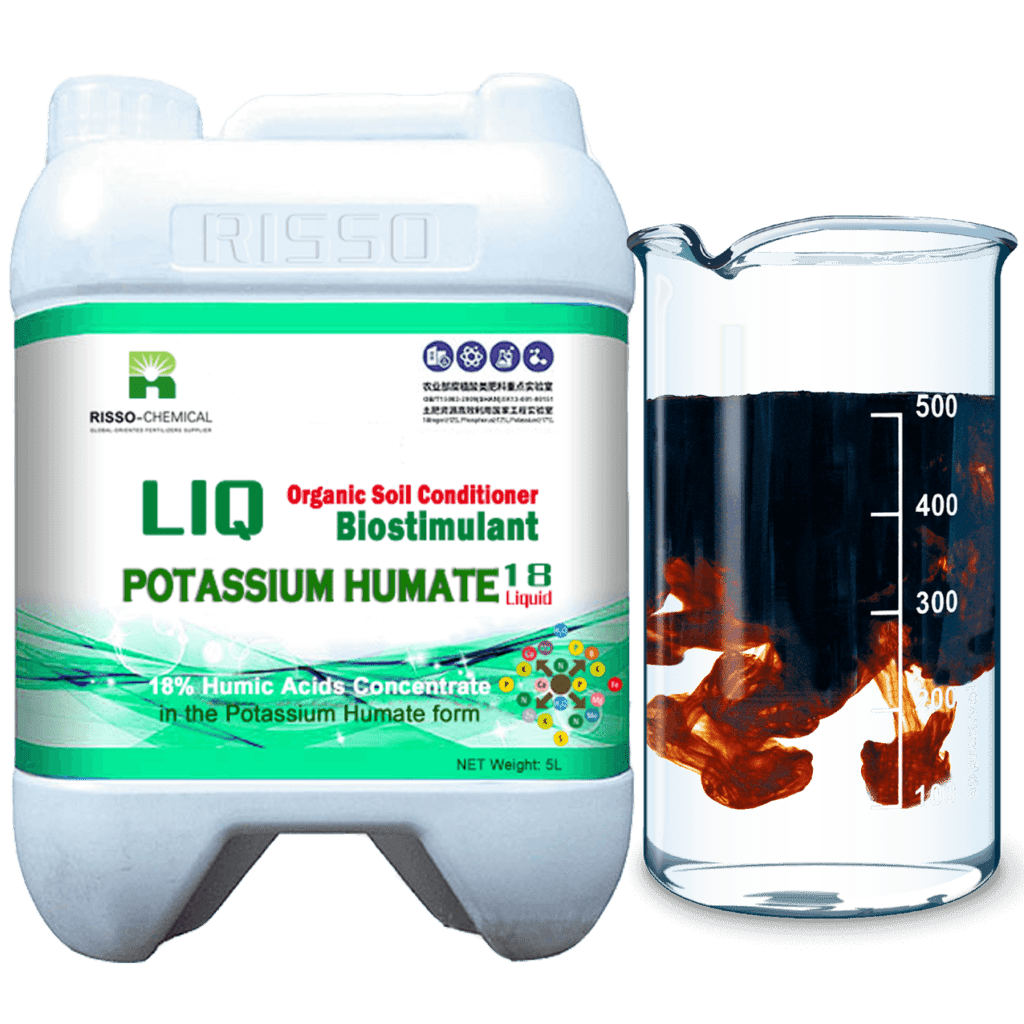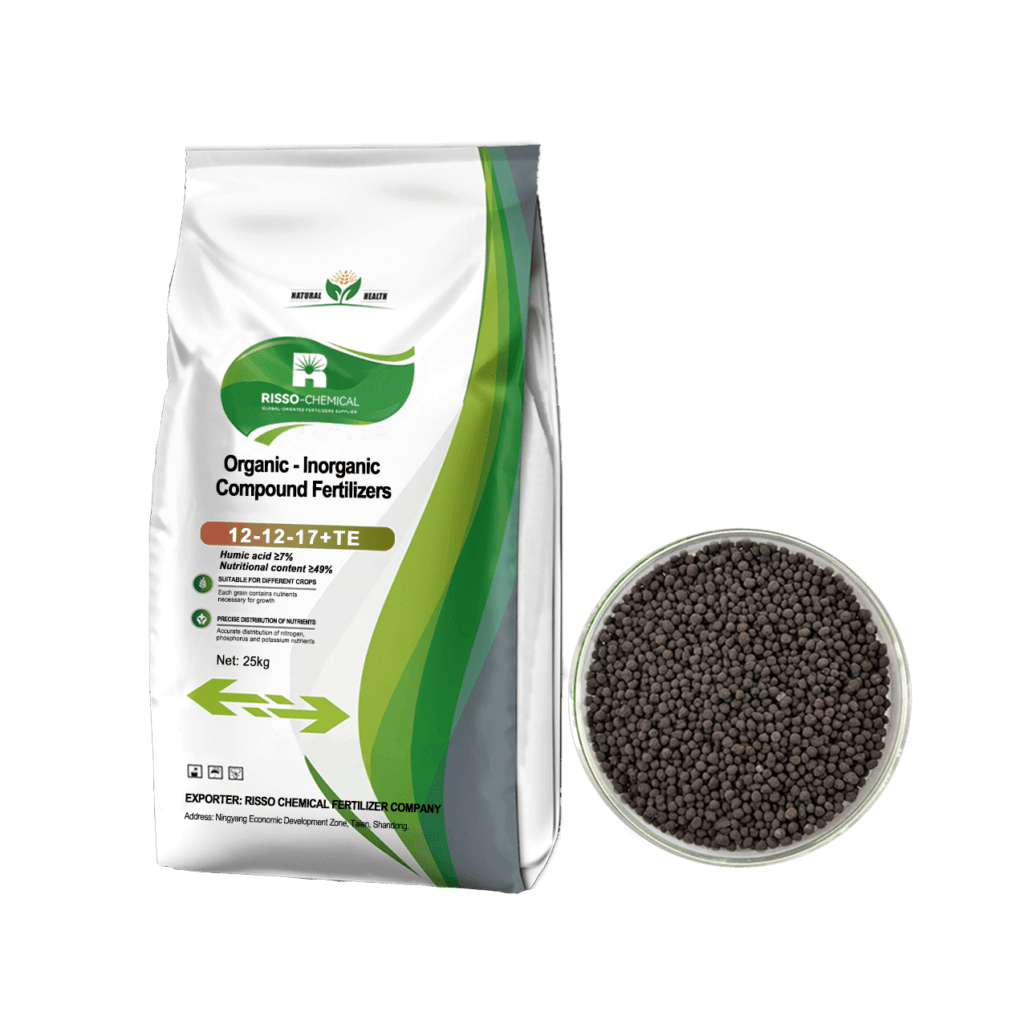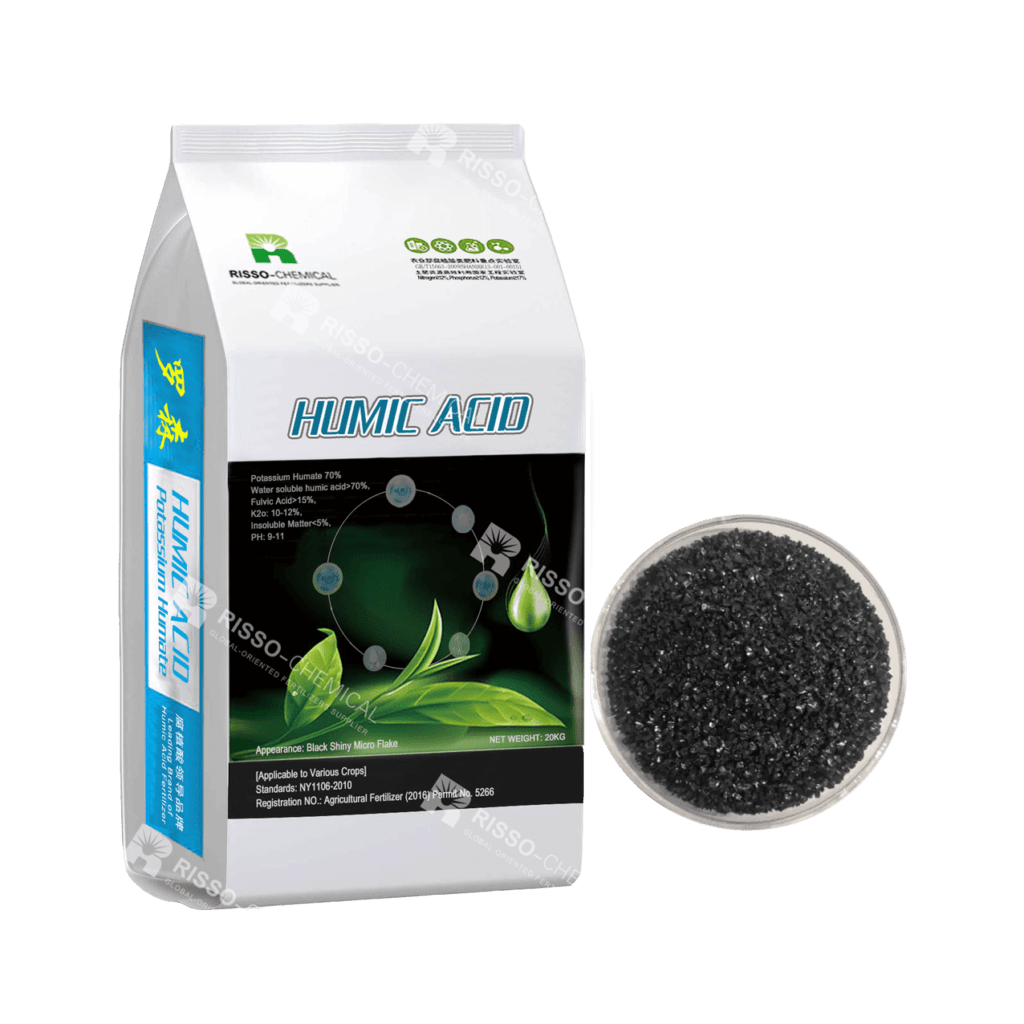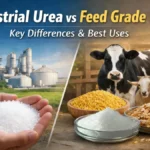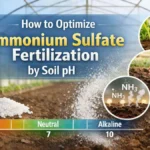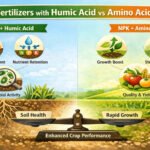Let more growers get greater benefits
Difference Between Humic Acid and Potassium Humate
- Industry News
- August 10, 2025
- 10:35 am
Soil health is the foundation of sustainable crop production, and understanding the difference between humic acid and potassium humate is essential for growers seeking higher yields and better nutrient efficiency. Humic acid is a naturally occurring organic compound that improves soil structure and moisture retention, while potassium humate—its potassium-enriched derivative—offers faster solubility and an immediate boost of plant-available potassium. In this article, Risso, a trusted supplier of premium humic solutions, explains how these two soil conditioners work, their key benefits, and how to choose the right product for your specific field conditions.


Table of Contents
- 1. Understanding Humic Acid1. Understanding Humic Acid
- 2. What Is Potassium Humate and Potassium Fulvate?2. What Is Potassium Humate and Potassium Fulvate?
- 3. Key Differences: Humic Acid vs. Potassium Humate3. Key Differences: Humic Acid vs. Potassium Humate
- 4. Critical Properties: Anti-Hard Water and Molecular Weight4. Critical Properties: Anti-Hard Water and Molecular Weight
- 5. Application Guidelines5. Application Guidelines
- 6. Common Misconceptions6. Common Misconceptions
- 7. Conclusion7. Conclusion
1. Understanding Humic Acid
Humic acid is a naturally occurring macromolecular organic substance formed through the long-term decomposition of plant, microbial, and animal residues in soil.
It contains complex aromatic rings and multiple functional groups such as carboxyl (–COOH), phenolic hydroxyl (–OH), carbonyl, and ketone groups.
These active sites make humic acid invaluable for:
Improving soil structure and porosity
Increasing organic matter and cation-exchange capacity
Enhancing moisture retention and nutrient availability
Humic acid can be classified into fulvic acid, brown humic acid, and black humic acid, with fulvic acid showing the smallest molecular weight and the highest biological activity.
2. What Is Potassium Humate and Potassium Fulvate?
Potassium Humate is the potassium salt of humic acid. Produced by neutralizing humic acid with potassium hydroxide or other potassium sources, it retains the benefits of humic acid while supplying readily available potassium.
Potassium Fulvate (high-fulvic-acid potassium humate) is a refined form with lower molecular weight and higher activity, offering faster solubility and stronger nutrient chelation. This makes it ideal for fertigation, foliar sprays, and drip-irrigation systems.
Risso’s Premium Potassium Humate range is designed with a high content of active fulvic components, ensuring superior solubility and consistent performance across different irrigation conditions.
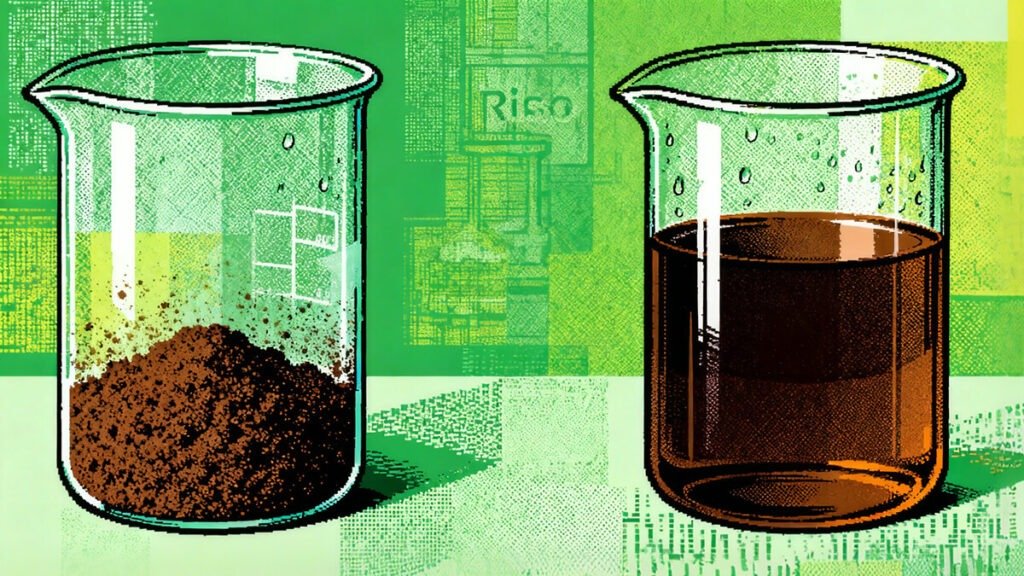

3. Key Differences: Humic Acid vs. Potassium Humate
| Feature | Humic Acid | Potassium Humate / Potassium Fulvate |
|---|---|---|
| Chemical Form & Potassium Content | Organic acid form, negligible potassium. | Potassium salt form, provides both humic substances and plant-available potassium. |
| Molecular Weight & Activity | Larger molecules (especially black humic fractions) act slowly; fulvic fractions are more active. | Smaller molecules (especially Potassium Fulvate) dissolve quickly and show immediate activity. |
| Mode of Action | Long-term soil conditioner, improves soil organic matter and structure. | Rapid nutrient uptake, enhances plant stress resistance and potassium availability. |
| Application Speed | Slow release and gradual effect. | Fast-acting, ideal for fertigation, foliar spray, or hydroponic use. |
| Cost & Use | More economical for bulk soil improvement. | Slightly higher cost, but provides dual benefits of soil conditioning and potassium nutrition. |
4. Critical Properties: Anti-Hard Water and Molecular Weight
Anti-Hard Water / Anti-Flocculation:
Hard water rich in calcium and magnesium can cause precipitation and clog irrigation lines. Potassium Fulvate from Risso is specially processed to resist flocculation, ensuring clear, stable nutrient solutions.Molecular Weight Impact:
Lower molecular weight fractions (hundreds to a few thousand Daltons) penetrate soil colloids more efficiently and are more readily absorbed by plant roots.
High-molecular black humic acids (hundreds of thousands of Daltons) work more slowly but improve long-term soil structure.Functional Groups:
Higher ratios of carboxyl and phenolic hydroxyl groups in Risso’s high-fulvic formulations deliver stronger nutrient chelation and enhance micronutrient availability.
5. Application Guidelines
| Scenario | Recommended Choice |
|---|---|
| Early Growth / Rapid Root Development | Use Risso Potassium Fulvate for quick nutrient uptake and strong root initiation. |
| Severe Soil Compaction / Low Organic Matter | Apply bulk Risso Humic Acid or high-black-humic potassium humate for long-term soil rebuilding. |
| Drip Irrigation with Hard Water | Choose Risso Anti-Hard-Water Potassium Humate to avoid clogging and precipitation. |
| Cost-Sensitive, Broad-Acre Applications | Use humic acid or standard potassium humate blends for economical base fertilization. |
| Improve Fertilizer Efficiency | Combine Risso Potassium Humate with NPK fertilizers to boost nutrient uptake and reduce leaching. |
6. Common Misconceptions
“Potassium Humate Equals High-Potash Fertilizer”
While it supplies potassium, the main value lies in its organic chelation and soil-conditioning properties. Always check the actual K₂O content.Quality Variations
Not all products labeled “potassium fulvate” contain high-fulvic fractions. Risso’s proprietary extraction and purification process ensures consistent molecular weight distribution and active functional groups.Hard Water Compatibility
Generic potassium humate may precipitate in calcium-rich water. Risso formulations are tested for anti-flocculation and high solubility.
7. Conclusion
Humic Acid is a natural, high-molecular organic substance that improves soil structure, stimulates beneficial microbial activity, and enhances nutrient retention. Potassium humate—the potassium salt of humic acid—delivers the same soil-conditioning benefits while supplying readily available potassium for rapid plant uptake. Potassium fulvate, such as Risso Premium Potassium Humate, stands out for its superior solubility, fast nutrient absorption, and exceptional anti-hard-water performance, making it an ideal choice for modern irrigation and fertigation systems.
Building on these advantages, Risso has developed a next-generation solution: organic–inorganic compound fertilizer. This balanced formulation combines the long-term soil-improving power of humic substances with the complete nutrition of NPK fertilizers (nitrogen, phosphorus, and potassium). By integrating Risso’s high-quality potassium humate and humic-based NPK blends, growers can achieve higher yields, stronger root systems, and lasting soil health—key benefits for progressive, high-efficiency agriculture.
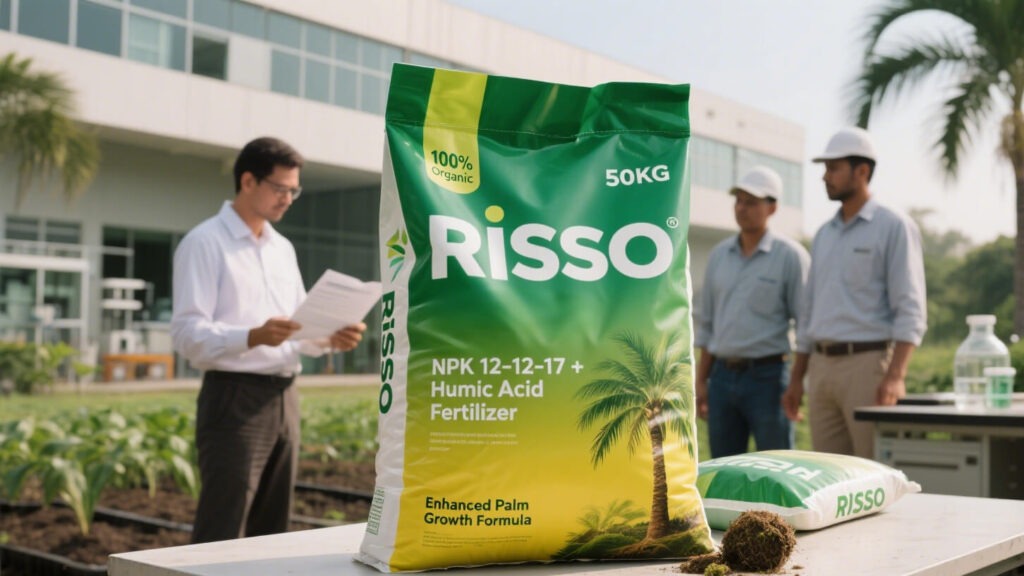

Organic–Inorganic Related Products
If you want to know other questions about Humic Acid or Potassium Humate please contact us and we will provide professional answers.
- Article
What will you get when touch?
✔ Quick & helpful reply within 6 hours.
✔ Tailored solutions for your project.
✔ One-stop product, tech, market
TRENDING
Want to find a China fertilizer manufacturer?
Risso will be your best choice; send us your request for your fertilizer details requirement
TAIAN RISSO CHEMICAL FERTILIZER CO.,LTD.
- Address: High-tech Development Zone, Taian City, Shandong Province
© Copyright 2017 RISSO CHEMICAL. All Rights Reserved.



